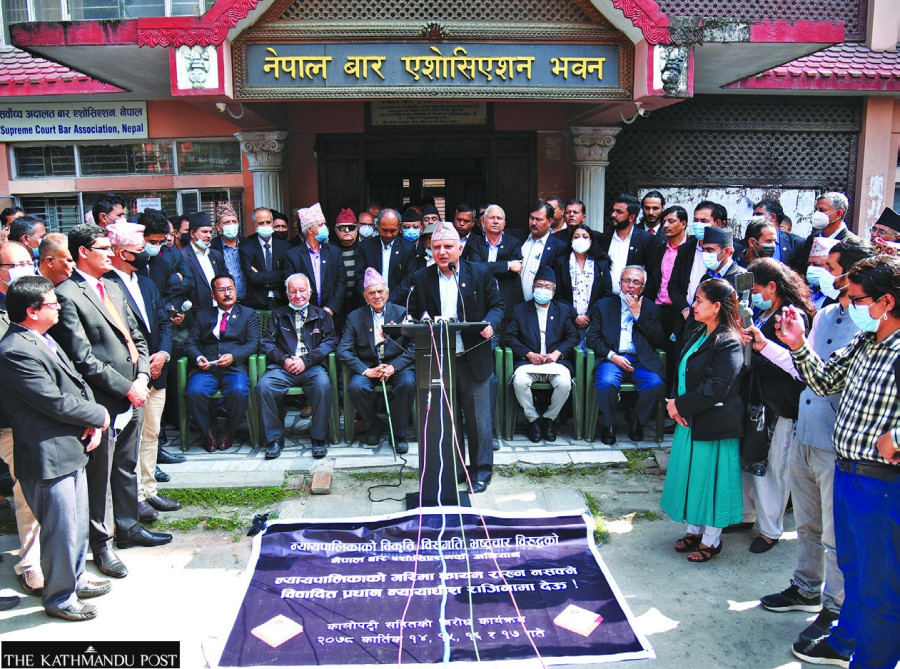National
Protesting lawyers say they will not relent until Chief Justice Rana quits
Prime Minister Deuba tells leaders of his Nepali Congress party that the executive cannot interfere in the judiciary.
Tika R Pradhan
A day after six lawyers were injured as they clashed with police during a demonstration at the Supreme Court, the protest organiser Nepal Bar Association has changed its tack and said it will now focus on blocking Chief Justice Cholendra Shumsher Rana from entering the court.
Six lawyers including vice-chair and general secretary of Nepal Bar Association Rakshya Basyal and Lilamani Poudel, respectively, sustained minor injuries in the scuffle with the police deployed on the Supreme Court premises Thursday.
Nepal Bar chair Chandeshwar Shrestha said they will continue their sit-in protest to block Rana’s entry until he resigns.
“We will continue our sit-in protest at the main gate of the Supreme Court and keep boycotting the hearings,” said Shrestha, chairperson of the Nepal Bar Association. “If he refuses to step down by Tuesday, we will hold a meeting and devise new protest plans.”
Asked whether the modality of their protests would be like Friday’s allowing the chief justice to enter the court from another gate, Shrestha said, “One cannot predict what happens when you are in a struggle. Things may change as per the situation.”
He said though they have not taken any decision yet but they could blockade both the gates from Sunday so as to ensure that Chief Justice Rana remains outside the apex court.
Issuing a statement on Friday, Nepal Bar has demanded the Supreme Court administration remove all the police personnel other than those deputed to the Supreme Court and reopen the gate between the Supreme Court and Nepal Bar premises to ensure free access to the court.
Security at the court has been beefed up since Thursday by deploying Armed Police Force personnel after the lawyers intensified their protests.
On Friday morning police had detained at least four persons who were chanting slogans against the agitating lawyers and in favor of the chief justice.
The 19 justices, who have been boycotting hearings except habeas corpus petitions for the last three weeks, have also said they would return to benches only after the lawyers return to work as the former cannot hear cases in the latter’s absence.
“We will resume habeas corpus hearings only from Sunday,” said one of the justices requesting anonymity. “But we cannot hear cases in lawyers’ absence and there could be conflict if lawyers of both the parties in a case are not present.”
The justice also said they have been working on ways to bring reforms to the judiciary during their ongoing meetings as Chief Justice Rana refused to follow the recommendations of the court’s reports on reforms.
“We have decided to develop a legal framework to implement a system of preparing the cause list through drawing of lots,” said the justice. “Once we work out the framework, we will request the chief justice to convene a full court and endorse the system.”
Earlier this year, a study panel led by Justice Hari Krishna Karki had recommended that the judiciary should adopt an automated system to assign cases to justices and until such a system is in place the cases should be allocated by drawing lots. The recommendation was made to end ‘bench shopping’, a corrupt practice of selecting benches/justices through middlemen to influence court verdicts.
All 19 justices in the 20-member Supreme Court have not heard a single case for the past three weeks except for habeas corpus petitions to put pressure on the chief justice to resign.
But the justices boycotted all hearings including habeas corpus on Friday to protest Thursday’s use of force against the protesting lawyers. “We could not hear cases Friday also because the lawyers decided to boycott hearings,” said another justice of the Supreme Court asking not to be named.
The justices are under extreme pressure to resume hearings as various sections of society have been criticising their boycott saying their protest has added to the sufferings of justice seekers.
“Political parties and their leaders can draw the attention of the parliament to take constitutional action against the chief justice now,” said one of the senior justices of the Supreme Court. “The situation is getting more complicated by the day. The chief justice has no option other than to resign his post to prevent the judiciary from further harm.”
However, the political parties and their leaders are not keen on bringing an impeachment motion, which is the only constitutional way to remove the chief justice.
On Friday, Prime Minister Sher Bahadur Deuba told the leaders of his party that the executive cannot interfere in the judiciary and it would be better if the issue is settled from within the judiciary.




 16.12°C Kathmandu
16.12°C Kathmandu














